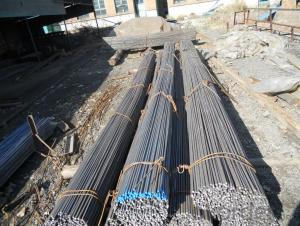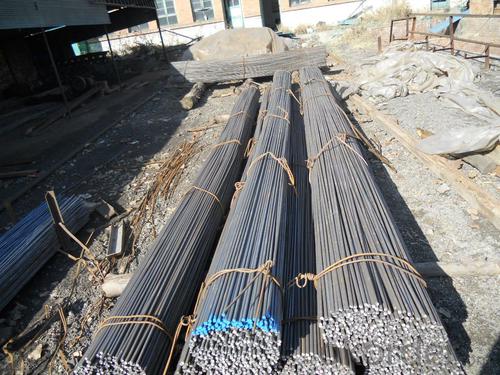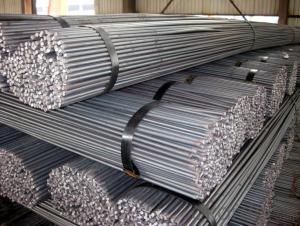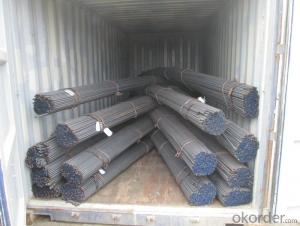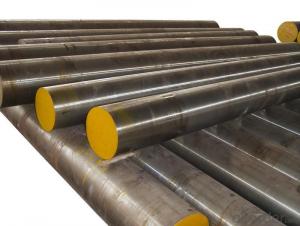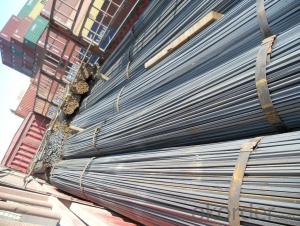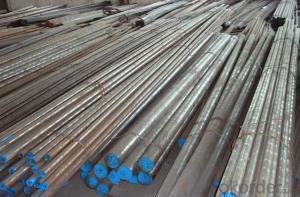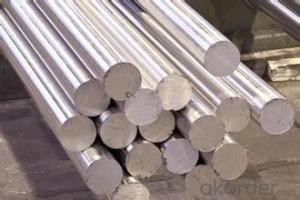High Quality Steel Round Bar Q235, A36, SS400
- Loading Port:
- Lianyungang
- Payment Terms:
- TT OR LC
- Min Order Qty:
- 25 m.t.
- Supply Capability:
- 200000 m.t./month
OKorder Service Pledge
OKorder Financial Service
You Might Also Like
Specifications of High Quality Steel Round Bar Q235, A36, SS400
1. Grade: GB, JIS, ASTM, EN
2. Grade: Q235, SS400, A36, S235JR
3. Diameter and mass: As below
Diameter | Mass | Diameter | Mass | Diameter | Mass |
(mm) | (kg/m) | (mm) | (kg/m) | (mm) | (kg/m) |
6 | 0.22 | 22 | 2.98 | 53 | 17.30 |
7 | 0.30 | 24 | 3.55 | 56 | 19.30 |
8 | 0.40 | 25 | 3.85 | 60 | 22.20 |
9 | 0.50 | 26 | 4.17 | 63 | 24.50 |
10 | 0.62 | 28 | 4.83 | 65 | 26.00 |
11 | 0.75 | 30 | 5.55 | 70 | 30.20 |
12 | 0.89 | 32 | 6.31 | 75 | 34.70 |
13 | 1.04 | 34 | 7.13 | 80 | 39.50 |
14 | 1.21 | 36 | 7.99 | 85 | 44.50 |
15 | 1.39 | 38 | 8.90 | 90 | 49.90 |
16 | 1.58 | 40 | 9.86 | 95 | 55.60 |
17 | 1.78 | 42 | 10.90 | 100 | 61.70 |
18 | 2.00 | 45 | 12.50 | 120 | 88.85 |
19 | 2.23 | 48 | 14.20 | 140 | 120.93 |
20 | 2.47 | 50 | 15.40 | 150 | 138.82 |
4. Material: Mild Steel
5. Heat treatment of high quality steel:
Fire: Isothermal annealing temperature is 800 ~ 880 °C, with 10 ~ 20 °C, the furnace cooling to about 600 °C, hardness above HB269.
Preheat temperature: 730-730 °C
Quenching temperature: 1190-1210 °C
Tempering temperature: 540-595 °C
Cold drawn, hardness 285 HBS
Cold drawn after annealing condition, hardness 277 HBS
Quenching methods: oil quenching, air cooling or salt bath quenching
Usage and Applications of High Quality Steel Round Bar Q235, A36, SS400
1) Suitable for making various strong cutting tool abrasion resistance, impact resistance.
2) Used to produce all kinds of high hard and super hard saw blade, drill, tap, broach, gear hob and various kinds of milling cutter.
3) Used for advanced punching die, screw die, and the toughness and complicated shape of the punch, etc.
4) Is used for cold forging die and drawing mode, etc.
5) Recommended watchcase factory, screw factory and other cold stamping products industry use.
Packaging & Delivery of High Quality Steel Round Bar Q235, A36, SS400
Packaging Detail: All goods are packed in bundle with steel strips and shipped by break bulk vessel or container (depend on target market and different ports)
Delivery Detail: 45 days
Trade terms: FOB, CFR, CIF
MOQ: 25 tons per specification; we can negotiate the quantity if the specification is normal or we have stock of one specification.
Weight: The price invoicing on theoretical weight basis or actual weight basis depends on customer’s request.
Shipment: The shipment of bulk break or container is depends on customer’s request and the situation of the port of destination.
Documents given: Full set of original clean on board bill of lading; Original signed commercial invoice; Original packing list; Policy of insurance; Certificate of origin and what the target market needs.
Production Flow of High Quality Steel Round Bar Q235, A36, SS400
The common processes are preheated forging quenching, dual refinement solution process, cooling quenching and isothermal quenching. We use heat treatment for dual refinement solution process. The main measures process is high temperature solution and refinement cycle. High temperature solution can improve the carbide morphology and particle size. The aim is to make the loop refinement ultrafine austenite grains.
- Q: Can steel round bars be used in the production of sporting goods?
- Yes, steel round bars can be used in the production of sporting goods. Steel is a versatile material known for its strength and durability, making it suitable for various applications in the sporting goods industry. Steel round bars can be used to create components such as shafts, handles, frames, and supports in sporting equipment like golf clubs, hockey sticks, weightlifting bars, and exercise equipment. The high tensile strength of steel ensures that these components can withstand the forces and pressures exerted during sports activities, providing stability and longevity to the products. Moreover, steel round bars can be easily machined, welded, and molded into different shapes and sizes according to the specific requirements of each sporting good. Steel's corrosion resistance properties also make it ideal for outdoor sporting equipment that is exposed to various weather conditions. Overall, steel round bars are a popular choice in the production of sporting goods due to their strength, durability, versatility, and ability to withstand the demands of different sports.
- Q: What is the cost of steel round bars compared to other materials?
- The price of steel round bars can differ depending on various factors, including the grade of steel, the bar's size and dimensions, and market conditions. However, in general, steel round bars are usually more economical than other materials commonly used in construction and manufacturing. For example, when compared to materials like aluminum or titanium, steel round bars are typically more affordable. Steel is widely available, making it a cost-efficient choice for many applications. Additionally, steel possesses excellent strength and durability attributes, making it a preferred material for structural purposes. In contrast to materials like wood or plastic, steel round bars may be initially more costly. Nevertheless, when considering the long-term advantages such as its longevity, resistance to corrosion, and minimal maintenance requirements, steel still provides a cost-effective solution. It is important to note that the price of steel round bars can significantly vary depending on market conditions, including the availability of raw materials and the demand for steel products. Additionally, specialized or high-grade steel alloys may come at a higher cost due to their specific properties or manufacturing processes. To summarize, steel round bars generally offer a cost-effective option compared to many other materials used in construction and manufacturing. However, it is always advisable to research current market prices and consider specific project requirements before making any final cost assessments.
- Q: What are the advantages of using structural steel round bars?
- There are several advantages of using structural steel round bars. Firstly, they provide excellent strength and durability, making them suitable for various structural applications. Additionally, their round shape allows for easy fabrication and installation, reducing construction time and costs. Steel round bars also have a high resistance to corrosion and can withstand extreme weather conditions. Moreover, they offer versatility in design as they can be easily bent, shaped, and welded to meet specific project requirements. Lastly, steel round bars are widely available and can be recycled, making them a sustainable choice for construction projects.
- Q: What is the difference between a hot-rolled and a peeled steel round bar?
- The production of a hot-rolled steel round bar involves heating a billet or ingot until it reaches a temperature suitable for shaping. The heated steel is then passed through a series of rollers to achieve the desired shape and size. This rolling process results in a bar with a rough surface texture and a slightly rounded edge. In contrast, a peeled steel round bar goes through a different manufacturing process. It is initially hot-rolled to achieve the desired shape and size, similar to the hot-rolled bar. However, after the initial hot rolling, the peeled bar undergoes a mechanical peeling process. This process entails removing the outer layer of the bar to achieve a smooth and shiny surface finish. Additionally, the peeling process contributes to improving the dimensional accuracy and surface quality of the bar. To summarize, the key distinction between a hot-rolled and a peeled steel round bar lies in the surface finish and dimensional accuracy. While a hot-rolled bar possesses a rough surface texture and a slightly rounded edge, a peeled bar exhibits a smooth and shiny surface finish with enhanced dimensional accuracy. The peeling process elevates the overall quality and appearance of the steel round bar, making it more appropriate for applications where aesthetics or precision hold significance.
- Q: What are the different types of steel alloys used for round bars?
- Round bars can be made from various steel alloys, each possessing unique characteristics that make them suitable for different purposes. Some commonly used steel alloys for round bars are as follows: 1. Carbon Steel: The most prevalent type of steel alloy for round bars, carbon steel is primarily composed of carbon and iron. It offers exceptional strength and toughness, making it ideal for applications in construction, manufacturing, and general engineering. 2. Stainless Steel: This alloy incorporates chromium, which grants it excellent resistance to corrosion. Consequently, stainless steel round bars are extensively utilized in the food and beverage industry, as well as in marine and chemical sectors where rust or oxidation is a concern. 3. Alloy Steel: This steel alloy is produced by adding elements like manganese, nickel, or chromium to enhance its mechanical properties. Alloy steel round bars are renowned for their high strength, hardness, and resistance to wear and tear. As a result, they find widespread use in automotive, aerospace, and machinery industries. 4. Tool Steel: Tool steel alloys are specifically engineered to possess remarkable hardness, wear resistance, and toughness. They are employed in the production of cutting tools, dies, and molds. Tool steel round bars are available in different grades, such as D2, O1, and A2, each offering specific properties for distinct applications. 5. Duplex Steel: This alloy combines austenitic and ferritic stainless steels, resulting in a blend of high strength and corrosion resistance. Duplex steel round bars are preferred in applications where both strength and resistance to corrosion are essential, such as in the oil and gas industry. These examples demonstrate the diversity of steel alloys used for round bars. The choice of a specific alloy depends on the desired properties and the intended application of the round bar.
- Q: Are steel round bars suitable for the production of springs?
- Indeed, springs can be produced using steel round bars. Steel, renowned for its exceptional strength and durability, finds widespread application in spring manufacturing. The circular configuration of these bars facilitates effortless shaping and molding, rendering them an ideal choice for spring production procedures. Steel round bars can be conveniently machined and heat-treated to impart the desired spring attributes, including elasticity and resilience. Furthermore, steel boasts a remarkable tensile strength, enabling it to endure substantial loads. Consequently, it proves well-suited for applications necessitating robust and dependable springs.
- Q: What is the difference between a bright and a precision ground steel round bar?
- A bright steel round bar refers to a steel bar that has undergone a process called bright drawing, which involves passing the bar through a die to improve its surface finish and dimensional accuracy. On the other hand, a precision ground steel round bar is a bar that has been further processed by grinding to achieve extremely tight dimensional tolerances and a smooth surface finish. Therefore, the main difference lies in the level of surface finish and dimensional accuracy achieved through different manufacturing processes.
- Q: What are the advantages of using carbon-manganese alloy steel round bars?
- There are several advantages of using carbon-manganese alloy steel round bars: 1. Strength and durability: Carbon-manganese alloy steel round bars offer high levels of strength and durability, making them suitable for use in demanding applications. They can withstand heavy loads and resist deformation, ensuring long-lasting performance. 2. Impact resistance: Carbon-manganese alloy steel round bars have excellent impact resistance, making them highly suitable for applications where there is a risk of impact or sudden loads. This property helps prevent fractures or breakages, enhancing safety and reliability. 3. Weldability: Carbon-manganese alloy steel round bars have good weldability, allowing for easy fabrication and joining. They can be easily welded using common techniques, making them versatile and cost-effective for various construction projects. 4. Corrosion resistance: Carbon-manganese alloy steel round bars exhibit good corrosion resistance, making them suitable for use in environments where exposure to moisture or corrosive substances is a concern. This property helps to extend the lifespan of the bars and reduces the need for frequent maintenance and replacement. 5. Cost-effective: Carbon-manganese alloy steel round bars are generally more cost-effective compared to other high-strength steel options. They offer a balance between strength and affordability, making them a cost-efficient choice for applications where high-strength materials are needed without excessive costs. 6. Machinability: Carbon-manganese alloy steel round bars are relatively easy to machine, allowing for precise shaping and finishing. This property makes them suitable for applications that require complex or custom designs. Overall, the advantages of using carbon-manganese alloy steel round bars include their strength, durability, impact resistance, weldability, corrosion resistance, cost-effectiveness, and machinability. These properties make them a reliable and versatile choice for a wide range of applications in industries such as construction, automotive, and manufacturing.
- Q: Can steel round bars be used for making storage tanks?
- Yes, steel round bars can be used for making storage tanks. Steel is a versatile and widely used material in various industries, including the manufacturing of storage tanks. Steel round bars are known for their strength, durability, and resistance to corrosion, making them suitable for storing a wide range of substances, including liquids and gases. The round shape of the bars allows for easy fabrication and assembly, ensuring the structural integrity of the storage tank. Additionally, steel round bars can be easily welded or bolted together, allowing for customization and flexibility in tank design. Overall, steel round bars are a popular choice for making storage tanks due to their reliability, longevity, and ability to withstand high pressure and extreme environmental conditions.
- Q: How do you calculate the moment of inertia for a steel round bar?
- The moment of inertia for a steel round bar can be calculated using the formula for the moment of inertia of a solid cylinder, which is given by I = (1/4)πr^4, where I is the moment of inertia and r is the radius of the round bar.
Send your message to us
High Quality Steel Round Bar Q235, A36, SS400
- Loading Port:
- Lianyungang
- Payment Terms:
- TT OR LC
- Min Order Qty:
- 25 m.t.
- Supply Capability:
- 200000 m.t./month
OKorder Service Pledge
OKorder Financial Service
Similar products
Hot products
Hot Searches
Related keywords
